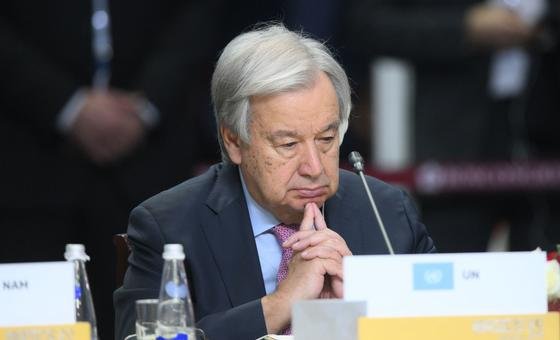The ‘BRICS’ group of the world’s five largest economies includes Brazil, Russia, India, China and South Africa, with Iran, Egypt, Ethiopia, Saudi Arabia and the United Arab Emirates also joining later.
The first meeting of this group was held in 2009. About 40 percent of the world’s population lives in countries belonging to the BRICS group.
The top UN official called on the group to build an equitable global financial system, strengthen climate action, improve access to technology and advance peace, particularly in the context of Gaza, Lebanon, Ukraine and Sudan.
The Secretary-General commended the group’s determination and support in addressing the issue at the international level.
“But no single group and no single country can act by itself or in isolation. “A community of nations needs to work together as a global family to address global challenges.”
These challenges include violent conflict, climate change, growing inequality, poverty and hunger, as well as the debt crisis, which puts the future of many vulnerable countries at risk.
The UN chief warned that under the 2030 Agenda for Sustainable Development, only 20% of the target is in place, the digital divide is widening and developing countries are not adequately represented in the UN Security Council and existing financial institutions.
Memorandum of understanding for the future
Advocating for a change in the current situation, the UN chief referred to the recent Future Conference held in New York at the UN headquarters last September. It presented a roadmap intended to strengthen multilateralism and advance peace, sustainable development and human rights.
At the end of this meeting, a memorandum of understanding for the future was presented, focusing on sustainable development, international peace and security, science and technology, youth and future generations, and global governance.
The UN chief noted that development and security have been shown through this conference and now words must be turned into action. “We believe that BRICS can play an important role in this direction.”
Improvements in four areas
The Secretary-General urged the BRICS group to take action in four areas, starting with the financial system. He said reform of the international financial framework must be accelerated, as it is currently outdated, ineffective or unfair.
He stressed the need for a stimulus package aimed at achieving the Sustainable Development Goals, so that multilateral development banks can increase their lending capacity to developing countries.
On climate change, he emphasized the need to reduce carbon emissions so as to limit global temperature rise to 1.5 degrees Celsius, in line with the Paris Agreement goals.
He said, the COP29 climate conference is just a few days away, which is being held in Baku, the capital of Azerbaijan. He said, this is the time for the countries to prepare a new national plan keeping in mind the year 2035.
Technology accessibility, peacekeeping
At the same time, the benefits of technology must reach every country, and the Global Digital Compact commits to international cooperation and capacity building to this end.
This is the first time the compact has included an agreement on international governance for artificial intelligence (AI), allowing each country to have its say on the issue.
He urged the international community to strengthen the existing mechanisms for maintaining peace in the world, including the formation of the Security Council as per the needs of the present era.
He said that for the future the MoE takes important steps on disarmament, including the first multilateral agreement on nuclear disarmament in the last 10 years. Additionally, the importance of using space as a weapon and countering lethal automatic weapons is also underlined.

